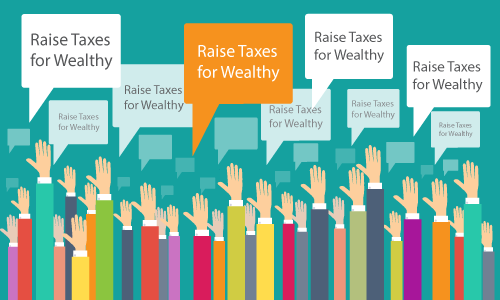Voters in Multiple States Choose Higher Taxes for the Wealthy

Of course, the big news from the election earlier this month was that Donald Trump shocked the world and defeated Hillary Clinton in the race to become the 45th president of the United States. However, there were several other important national, as well as local, election races and issues that were decided on November 8th. Not the least of which were several state measures aimed at raising taxes on high net worth individuals.
To that end, voters in both California and Maine decided that the rich needed to pay more taxes. In Maine, the vote to raise the state’s top tax rate from 7.15 percent to 10.15 percent was extremely close, passing by a narrow 50.4 percent to 49.6 percent margin. That means Maine will have the second highest top tax rate in the country in 2017, surpassing Oregon, which was number two in 2016 at 9.9 percent.
In California, meanwhile, the vote wasn’t even close, with 62 percent voting to extend temporary tax hikes already in place. Proposition 55 extended the hikes originally implemented in 2012 with Proposition 30. That means top earners, those who make $1 million or more a year, will continue to pay a tax rate of 13.3 percent at least until 2030. California will continue to have the highest tax rate for top earners in 2017.
So, while all signs point to Donald Trump lowering the federal tax rates, if you live in California or Maine and you’re a top earner, you won’t see any relief in the coming years in your state taxes.
http://www.forbes.com/sites/ashleaebeling/2016/11/10/voters-okay-state-income-tax-hikes-for-the-rich/#71480a7b16d0
Details of Patterns of Reorganization
Details of Patterns of Reorganization • “A” Reorganization • “B” Reorganization • “C” Reorganization • “D” Reorganization • “E” Reorganization • “F” Reorganization • “G” Reorganization “A” Reorganization Type “A” Reorganization consists of • Merger • Consolidation Both involve the acquisition of one company’s assets by another. Merger Explanation: • Target transfers its assets and…
“B” Reorganization
“B” Reorganization Type “B” involves the acquisition of stock of one corporation by another, and the target corporation becomes a subsidiary of the acquiring, as a result. Requirements of “B” Reorganization 1) The acquisition must be one of a series of acquisitions that are part of an overall plan to acquire the requisite control. 2)…
“C” Reorganization
“C” Reorganization The target corporation must liquidate as part of the plan of reorganization unless the IRS waives this requirement.’ As a result, the shareholders of the target corporation become shareholders in the acquiring corporation. In determining the tax consequences to the liquidating target, the reorganization provisions govern-not the liquidation rules of §§ 336 and…
“D” Reorganization
“D” reorganization: “Spin-off” and “Split-off” acquisitive d reorganization “D” Reorganization Explanation: * Corporate T contains the assets of former corporation A and of T. * Corporation A goes out of existence Corporation A’s shareholder’s control Corporation T. Requirements for Divisive “D” d reorganization requirements imposed by IRC §355 * Distribution of Control -by the…


